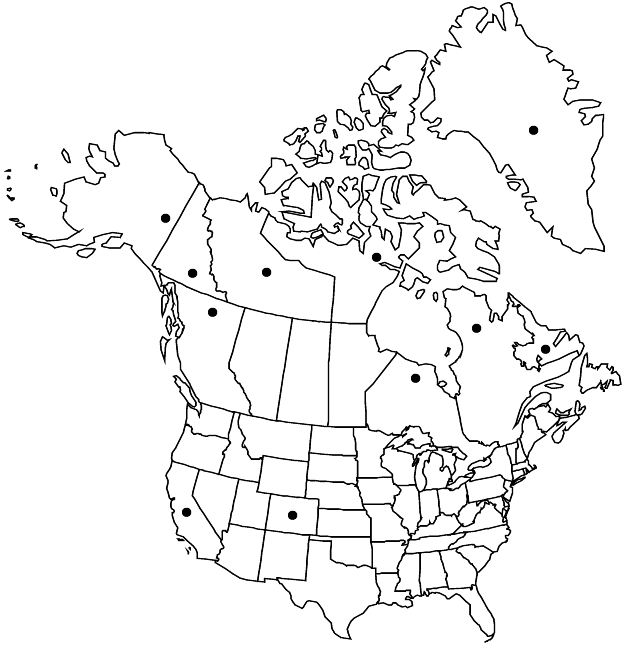Difference between revisions of "Minuartia stricta"
J. Bot. 37: 320. 1899.
FNA>Volume Importer |
imported>Volume Importer |
||
| (3 intermediate revisions by 2 users not shown) | |||
| Line 11: | Line 11: | ||
|name=Spergula stricta | |name=Spergula stricta | ||
|authority=Swartz | |authority=Swartz | ||
| + | |rank=species | ||
|publication_title=Kongl. Vetensk. Acad. Nya Handl. | |publication_title=Kongl. Vetensk. Acad. Nya Handl. | ||
|publication_place=20: 229. 1799 | |publication_place=20: 229. 1799 | ||
| Line 17: | Line 18: | ||
|name=Alsinanthe stricta | |name=Alsinanthe stricta | ||
|authority=(Swartz) Reichenbach | |authority=(Swartz) Reichenbach | ||
| + | |rank=species | ||
}} {{Treatment/ID/Synonym | }} {{Treatment/ID/Synonym | ||
|name=Arenaria stricta var. uliginosa | |name=Arenaria stricta var. uliginosa | ||
|authority=(Schleicher ex Lamarck & de Candolle) B. Boivin | |authority=(Schleicher ex Lamarck & de Candolle) B. Boivin | ||
| + | |rank=variety | ||
}} {{Treatment/ID/Synonym | }} {{Treatment/ID/Synonym | ||
|name=Arenaria uliginosa | |name=Arenaria uliginosa | ||
|authority=Schleicher ex Lamarck & de Candolle | |authority=Schleicher ex Lamarck & de Candolle | ||
| + | |rank=species | ||
}} | }} | ||
|hierarchy=Caryophyllaceae;Caryophyllaceae subfam. Alsinoideae;Minuartia;Minuartia stricta | |hierarchy=Caryophyllaceae;Caryophyllaceae subfam. Alsinoideae;Minuartia;Minuartia stricta | ||
| Line 48: | Line 52: | ||
-->{{#Taxon: | -->{{#Taxon: | ||
name=Minuartia stricta | name=Minuartia stricta | ||
| − | |||
|authority=(Swartz) Hiern | |authority=(Swartz) Hiern | ||
|rank=species | |rank=species | ||
| Line 63: | Line 66: | ||
|publication year=1899 | |publication year=1899 | ||
|special status= | |special status= | ||
| − | |source xml=https:// | + | |source xml=https://bitbucket.org/aafc-mbb/fna-data-curation/src/2e0870ddd59836b60bcf96646a41e87ea5a5943a/coarse_grained_fna_xml/V5/V5_276.xml |
|subfamily=Caryophyllaceae subfam. Alsinoideae | |subfamily=Caryophyllaceae subfam. Alsinoideae | ||
|genus=Minuartia | |genus=Minuartia | ||
Latest revision as of 22:10, 5 November 2020
Plants perennial, cespitose to mat-forming. Taproots filiform to slightly thickened. Stems ascending to erect or procumbent, green, (0.8–)3–12 cm, glabrous, internodes of all stems 0.5–10 times as long as leaves. Leaves barely if at all overlapping, connate proximally, with tight, scarious to herbaceous sheath 0.2–0.5 mm; blade straight to slightly outward curved, green, flat, 1-veined, occasionally 3-veined abaxially, linear to linear-oblong or subulate, (2–)4–10 × (0.3–)0.5–1.5 mm, flexuous, margins not thickened, scarious, smooth, apex green or purple, mostly rounded, slightly navicular, shiny, glabrous; axillary leaves present among proximal cauline leaves. Inflorescences 1–3(–5)-flowered, open cymes or flowers solitary, terminal; bracts subulate, herbaceous. Pedicels 0.3–3 cm, glabrous. Flowers: hypanthium disc-shaped; sepals 1–3-veined, often prominently, becoming ribbed in fruit, broadly elliptic to ovate (herbaceous portion broadly elliptic to ovate), (1.5–)2.5–3.2 mm, to 4 mm in fruit, apex green to purple, acute to acuminate, not hooded, glabrous; petals lanceolate to spatulate or orbiculate, (0.6–)0.8–1 times as long as sepals, apex rounded, entire, or petals rudimentary or absent. Capsules on stipe ca. 0.1–0.2 mm, ovoid, 2.5–3.2 mm, shorter than or equaling sepals. Seeds brown or reddish brown, orbiculate with radicle prolonged into rounded bump, somewhat compressed, 0.4–0.6 mm, smooth or obscurely low-tuberculate (50×). 2n = 22 (Europe), 26, 30 (Europe).
Phenology: Flowering spring–summer.
Habitat: Moist, granitic gravels, sedge meadows, heath, alpine or arctic tundra
Elevation: 100-3800 m
Distribution

Greenland, B.C., Nfld. and Labr. (Labr.), N.W.T., Nunavut, Ont., Que., Yukon, Alaska, Calif., Colo., Europe, Asia.
Discussion
Minuartia stricta is circumpolar and sometimes has been included within M. michauxii (e.g., B. Maguire 1958; H. J. Scoggan 1978–1979, part 3).
Plants from alpine sites in California are, in spite of smaller stature and often smaller floral parts, Minuartia stricta. Colorado populations appear to vary widely in habit, but floral and fruit features match M. stricta.
Selected References
None.